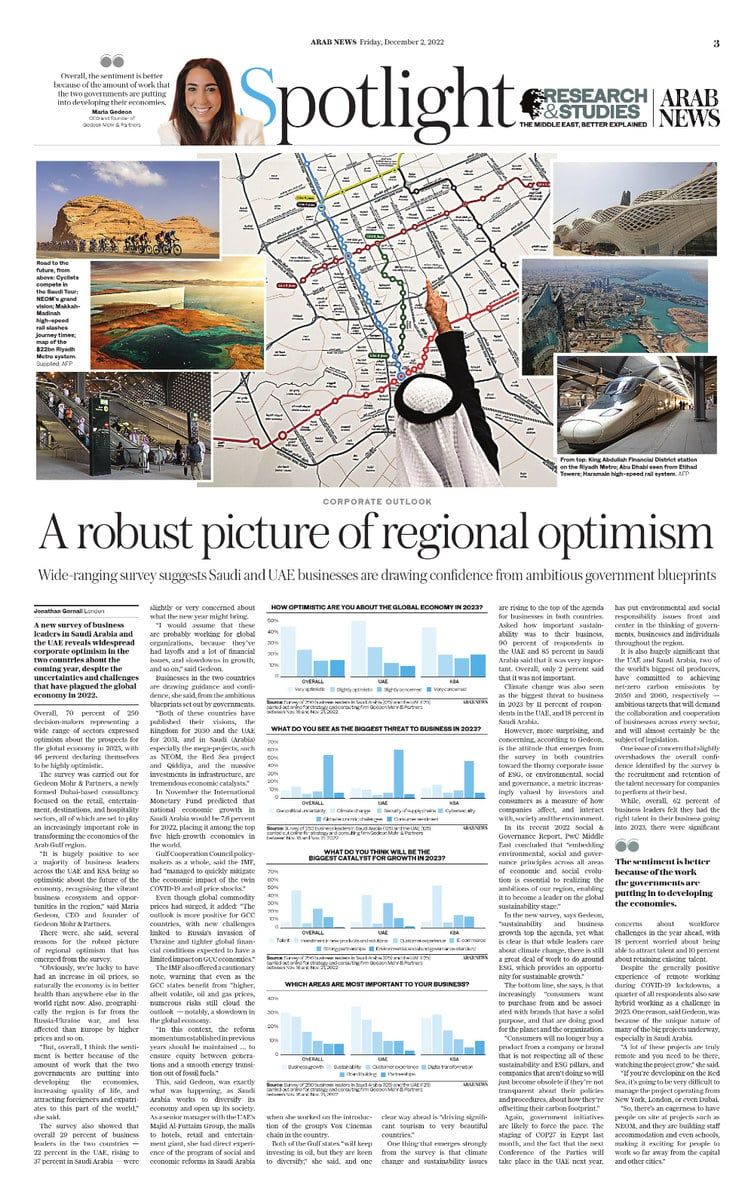
Why corporate optimism in Saudi Arabia and UAE remains widespread despite global economic headwinds
Overall, 70 percent of 250 decision-makers representing a wide range of sectors expressed optimism about the prospects for the global economy in 2023, with 46 percent declaring themselves to be very optimistic.
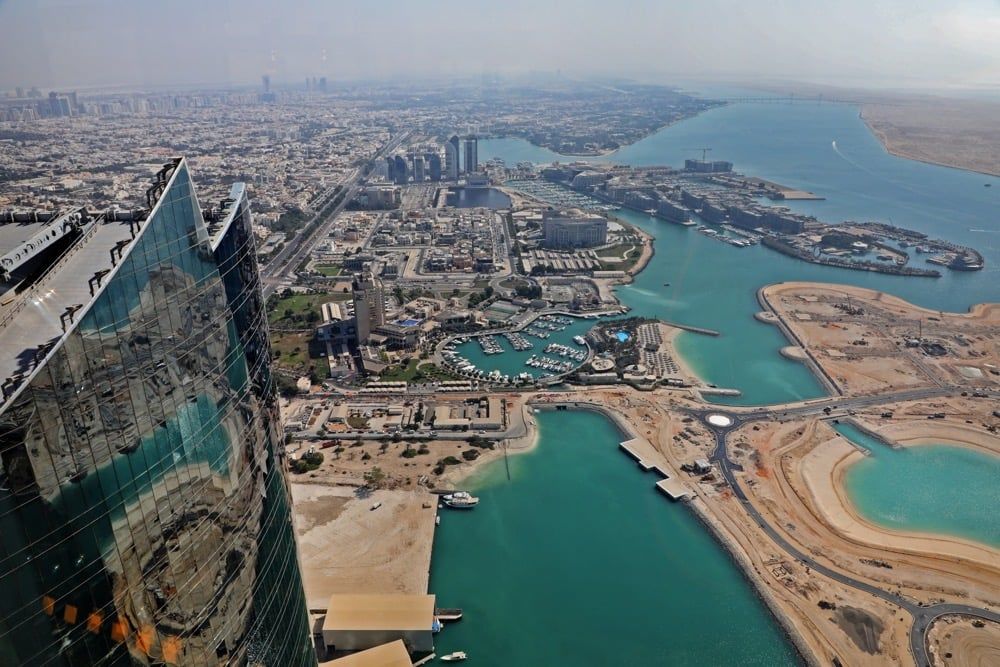 There is widespread corporate optimism in Saudi Arabia and UAE.
There is widespread corporate optimism in Saudi Arabia and UAE.
“It is hugely positive to see a majority of business leaders across the UAE and KSA being so optimistic about the future of the economy, recognising the vibrant business ecosystem and opportunities in the region,” said Maria Gedeon, CEO and founder of Gedeon Mohr & Partners.
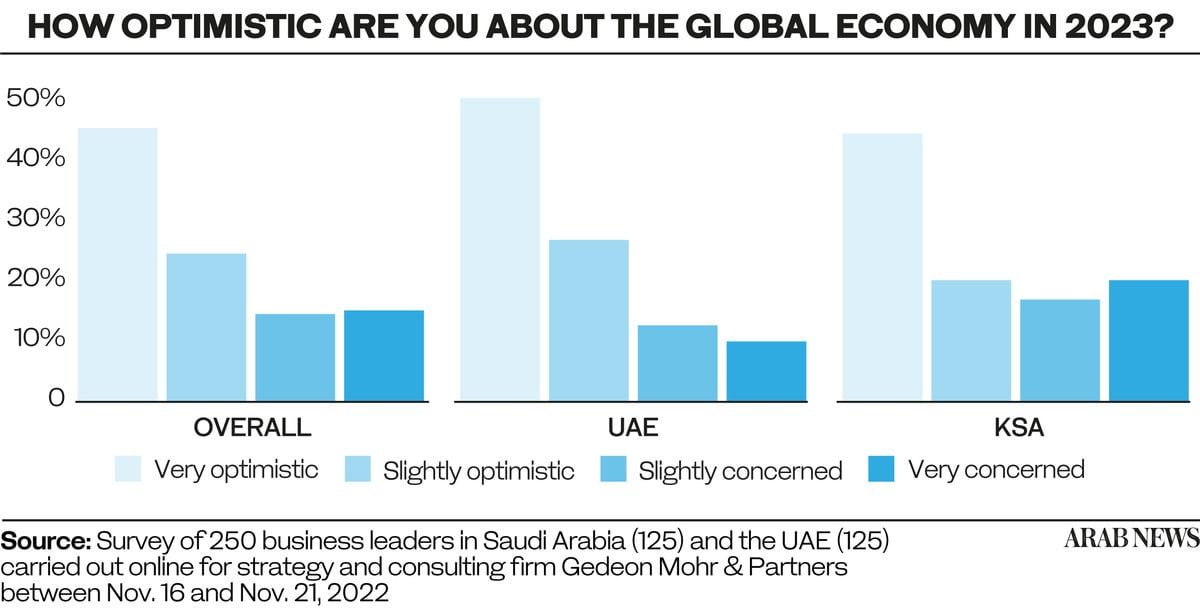
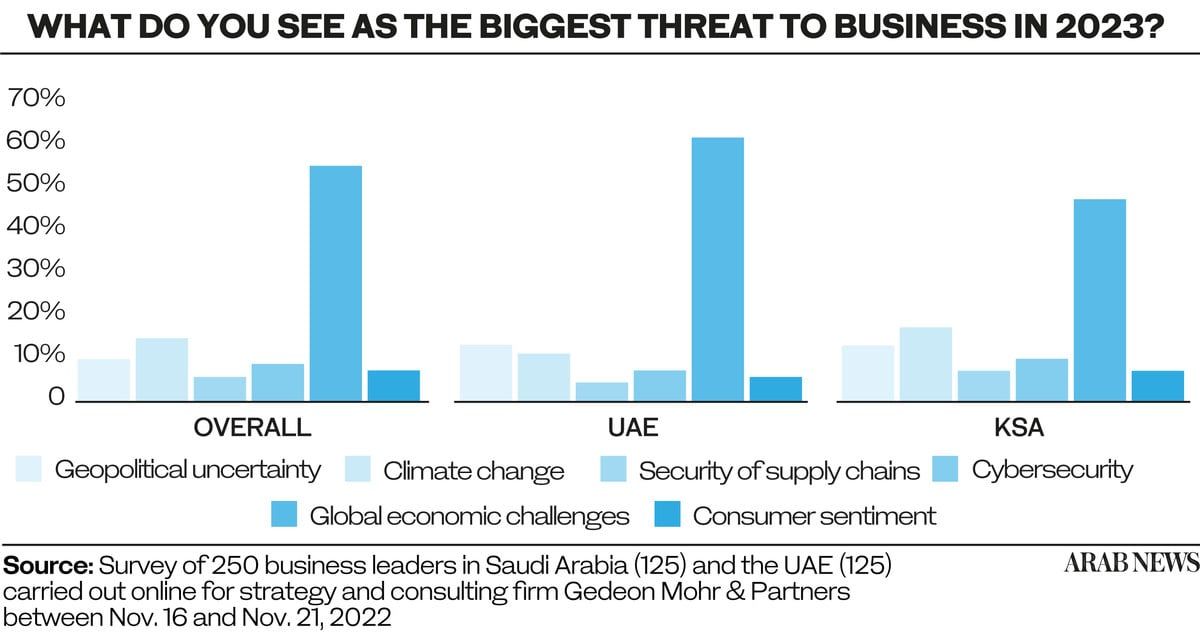
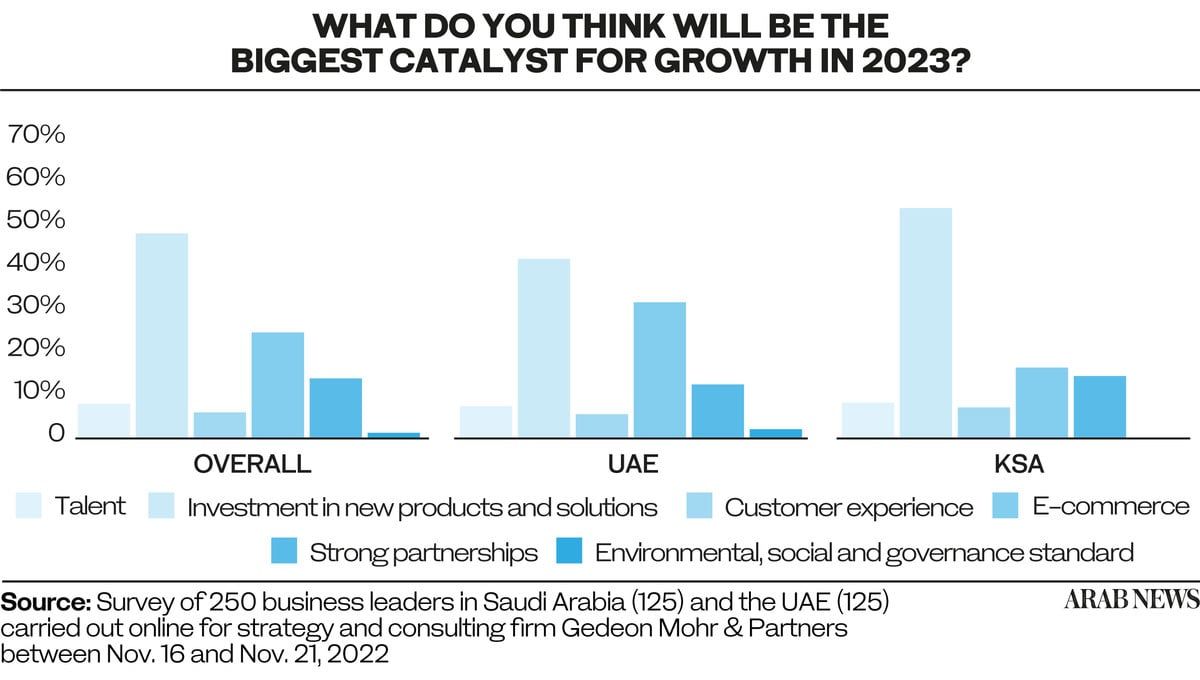
There were, she said, several reasons for the robust picture of regional optimism that has emerged from the survey.
“Obviously, we’re lucky to have had an increase in oil prices, so naturally the economy is in better health than anywhere else in the world right now. Also, geographically the region is far from the Russia-Ukraine war, and less affected than Europe by higher prices and so on.
“But overall, I think the sentiment is better because of the amount of work that the two governments are putting into developing the economies, increasing quality of life, and attracting foreigners and expatriates to this part of the world.”
The survey also showed that overall 29 percent of business leaders in the two countries — 22 percent in the UAE, rising to 37 percent in Saudi Arabia — were slightly or very concerned about what the new year might bring.
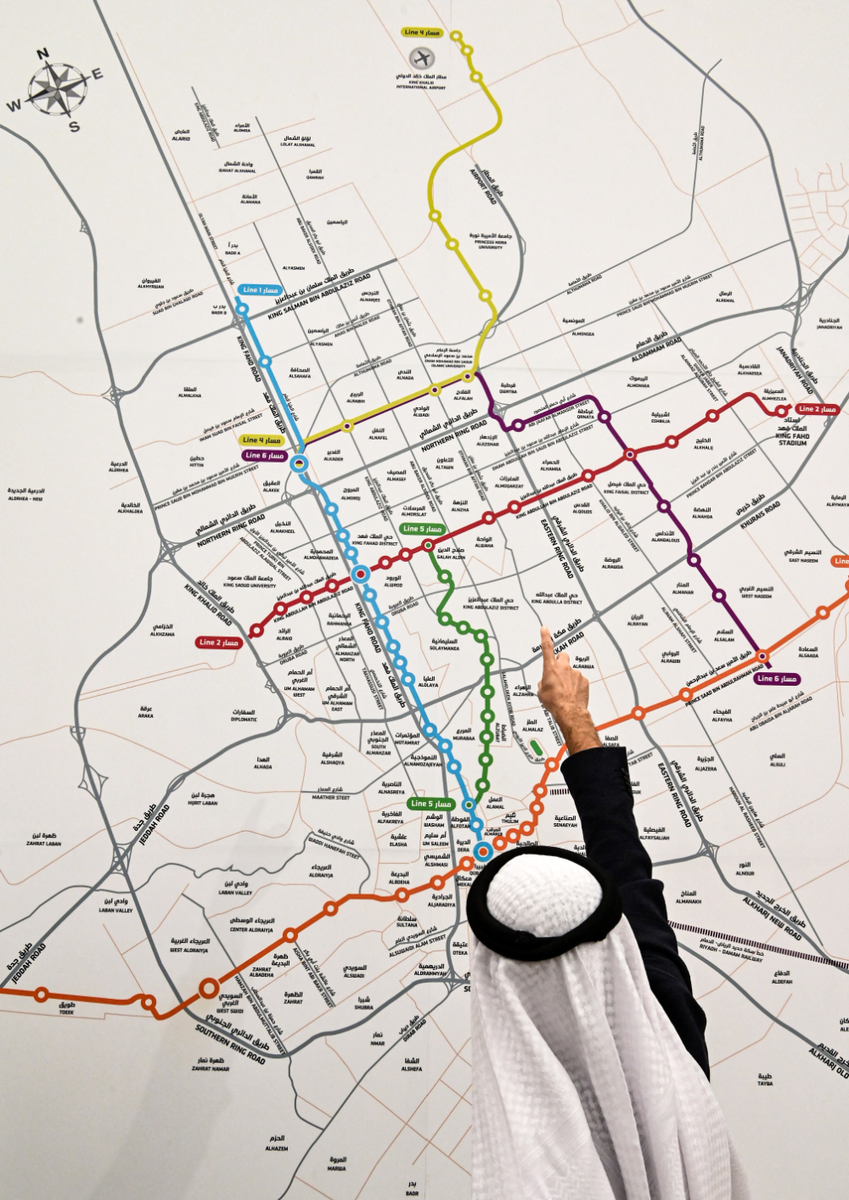 There were several reasons for the robust picture of regional optimism that has emerged from the survey.
There were several reasons for the robust picture of regional optimism that has emerged from the survey.
“I would assume that these are probably working for global organizations, because they’ve had layoffs and a lot of financial issues, and slowdowns in growth, and so on,” said Gedeon.
Businesses in the two countries are drawing guidance and confidence, she said, from the ambitious blueprints set out by governments.
“Both of these countries have published their visions, the Kingdom for 2030 and the UAE for 2031, and in Saudi (Arabia) especially the mega-projects, such as NEOM, the Red Sea project and Qiddiya, and the massive investments in infrastructure, are tremendous economic catalysts.”
In November the International Monetary Fund predicted that GDP growth in Saudi Arabia would be 7.6 percent for 2022, placing it among the top five high-growth economies in the world.
Gulf Cooperation Council policymakers as a whole, said the IMF, had “managed to quickly mitigate the economic impact of the twin COVID-19 and oil price shocks.”
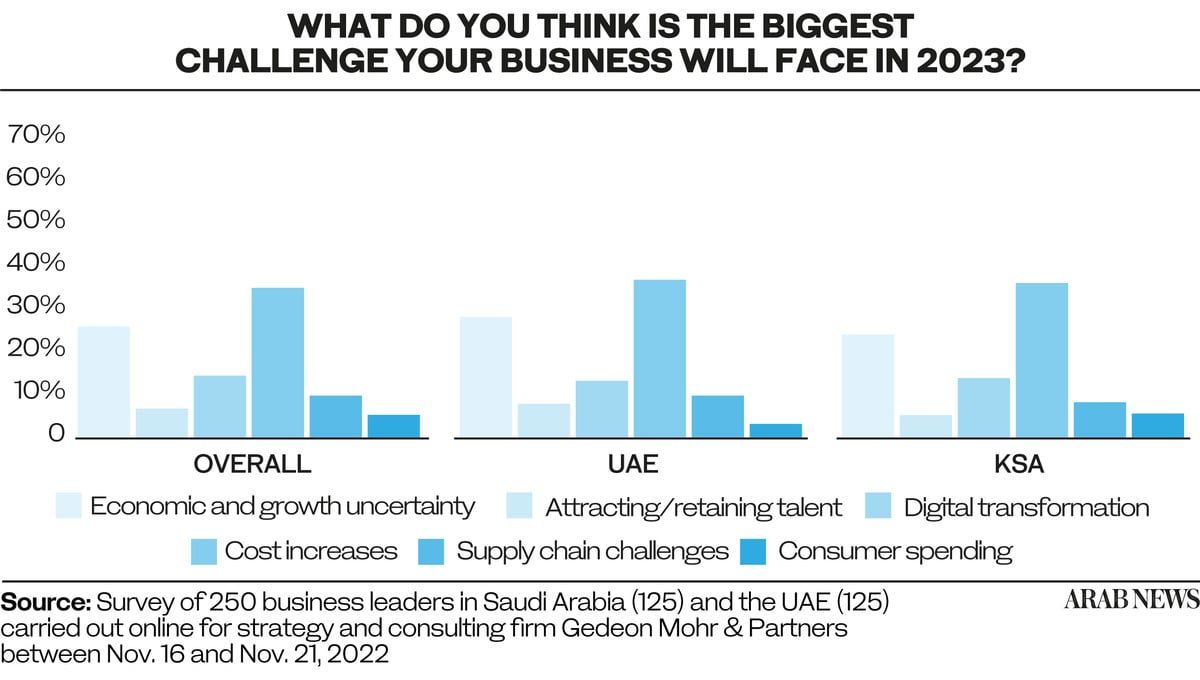
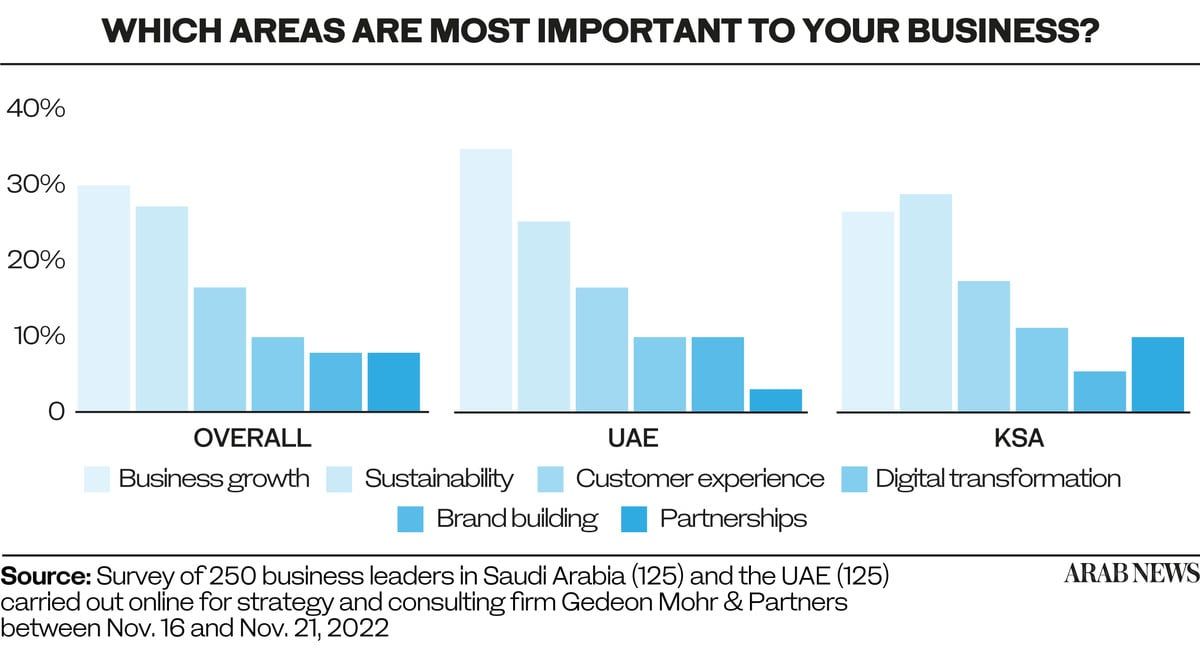
Even though global commodity prices had surged, it added: “The outlook is more positive for GCC countries, with new challenges linked to Russia’s invasion of Ukraine and tighter global financial conditions expected to have a limited impact on GCC economies.”
The IMF also offered a cautionary note, warning that even as the GCC states benefit from “higher, albeit volatile, oil and gas prices, numerous risks still cloud the outlook — notably, a slowdown in the global economy.
“In this context, the reform momentum established in previous years should be maintained … to ensure equity between generations and a smooth energy transition out of fossil fuels.”
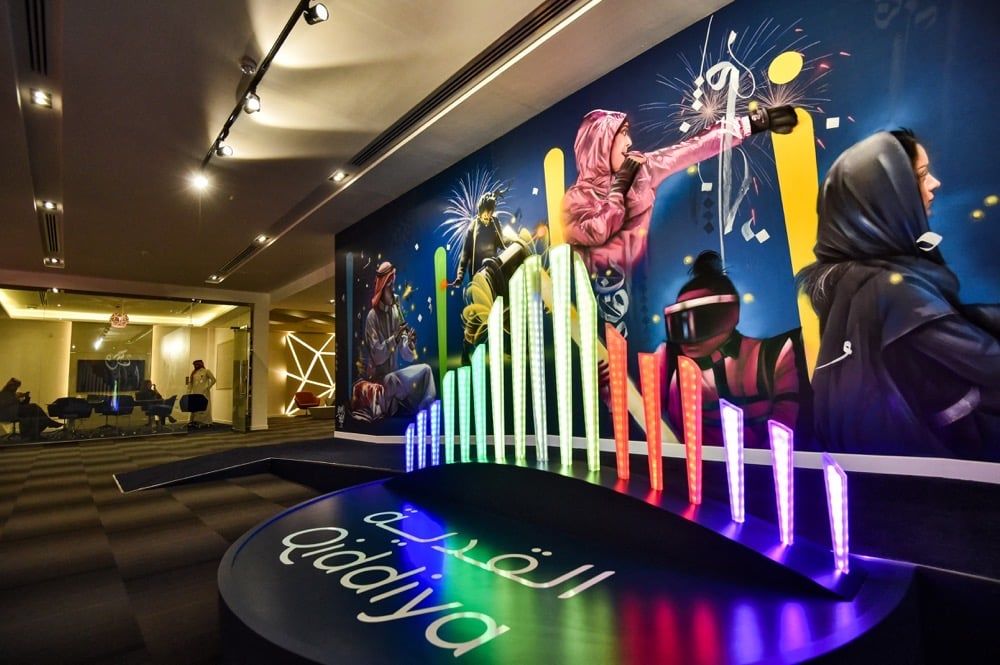 Saudi mega-projects, such as NEOM, the Red Sea project and Qiddiya, and
the massive investments in infrastructure, are tremendous economic
catalysts.
Saudi mega-projects, such as NEOM, the Red Sea project and Qiddiya, and
the massive investments in infrastructure, are tremendous economic
catalysts.
This, said Gedeon, was exactly what was happening, as Saudi Arabia works to diversify its economy and open up its society. As a senior manager with the UAE’s Majid Al-Futtaim Group, the malls to hotels, retail and entertainment giant, she had direct experience of the ongoing program of social and economic reforms in Saudi Arabia when she worked on the introduction of the group’s Vox Cinemas chain in the country.
Both of the Gulf states “will keep investing in oil, but they are keen to diversify,” she said, and one clear way ahead is “driving significant tourism to very beautiful countries.”
One thing that emerges strongly from the survey is that climate change and sustainability issues are rising to the top of the agenda for businesses in both countries. Asked how important sustainability was to their business, 90 percent of respondents in the UAE and 85 percent in Saudi Arabia said it was very important. Overall, only 2 percent said it was not important.
Climate change was also seen as the biggest threat to business in 2023 by 11 percent of respondents in the UAE, and 18 percent in Saudi Arabia.
However, more surprising, and concerning, says Gedeon, is the attitude that emerges from the survey in both countries toward the thorny corporate issue of ESG, or environmental, social and governance, a metric increasingly valued by investors and consumers as a measure of how companies impact upon, and interact with, society and the environment.
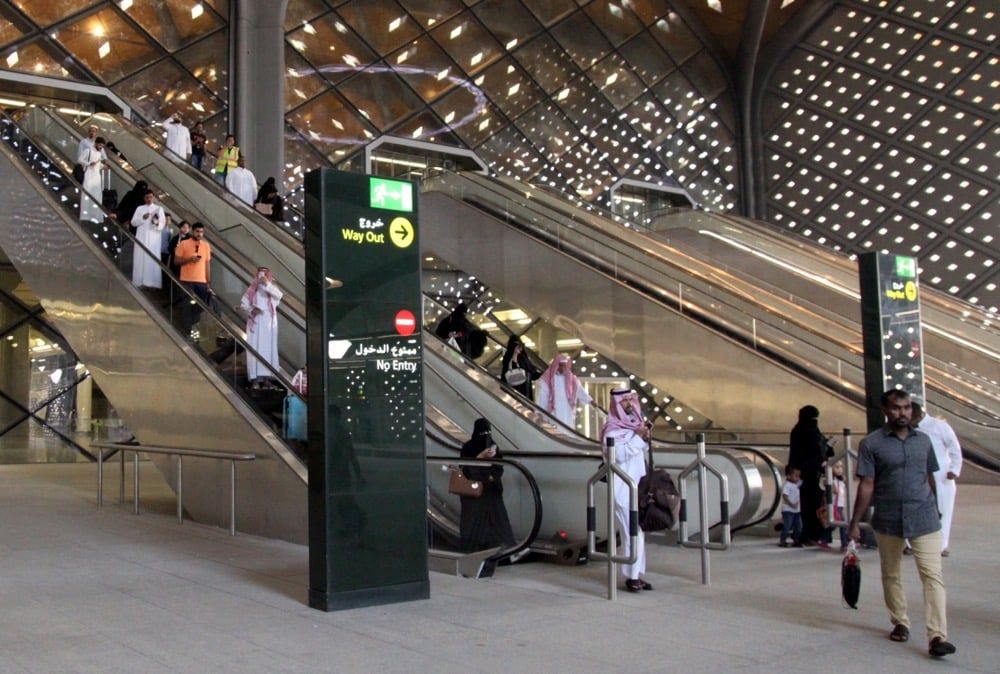 GCC policymakers as a whole, said the IMF, had “managed to quickly
mitigate the economic impact of the twin COVID-19 and oil price shocks.”
GCC policymakers as a whole, said the IMF, had “managed to quickly
mitigate the economic impact of the twin COVID-19 and oil price shocks.”
In its recent 2022 Social & Governance Report, PwC Middle East concluded that “embedding environmental, social and governance principles across all areas of economic and social evolution is essential to realizing the ambitions of our region, enabling it to become a leader on the global sustainability stage.”
In the new survey, says Gedeon, “sustainability and business growth top the agenda, yet what is clear is that while leaders care about climate change, there is still a great deal of work to do around ESG, which provides an opportunity for sustainable growth.”
The bottom line, she says, is that increasingly “consumers want to purchase from and be associated with brands that have a solid purpose, and that are doing good for the planet and the organization.
“Consumers will no longer buy a product from a company or brand that is not respecting all of these sustainability and ESG pillars, and companies that aren’t doing so will just become obsolete if they’re not transparent about their policies and procedures, about how they’re offsetting their carbon footprint.”
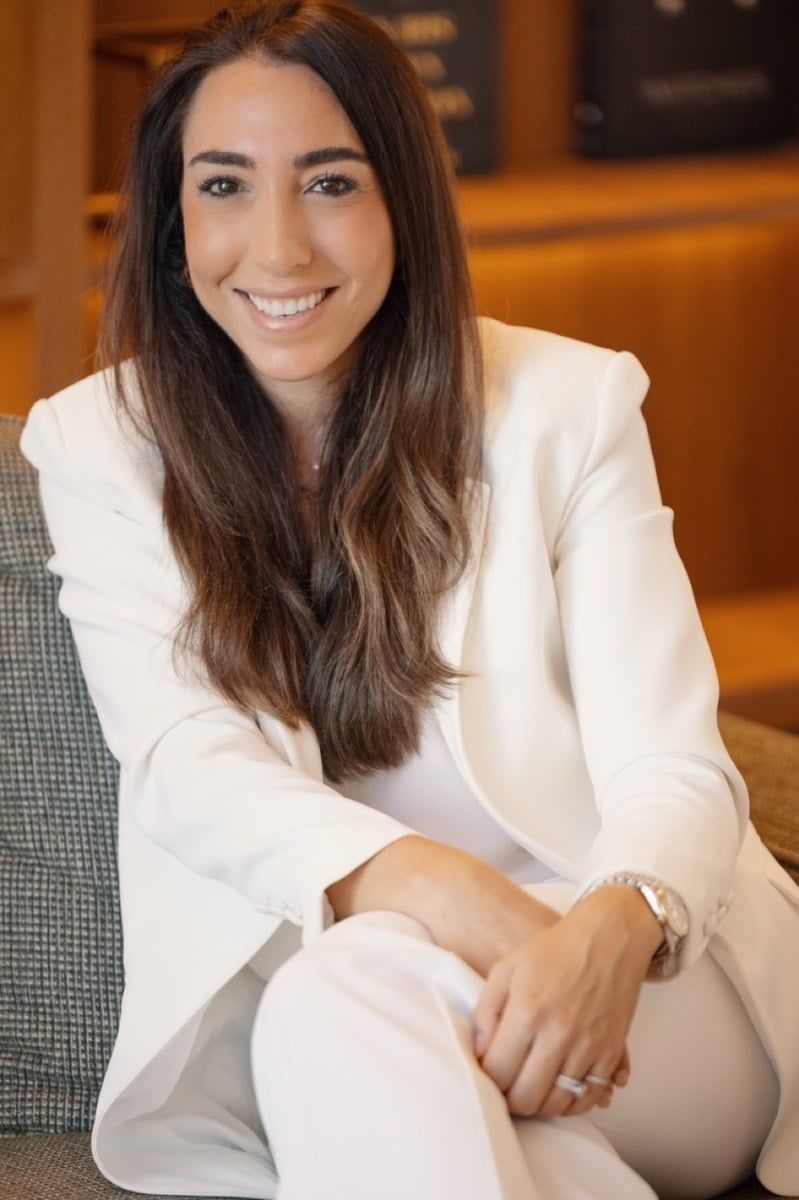 “It is hugely positive to see a majority of business leaders across the
UAE and KSA being so optimistic about the future of the economy,
recognising the vibrant business ecosystem and opportunities in the
region,” said Maria Gedeon.
“It is hugely positive to see a majority of business leaders across the
UAE and KSA being so optimistic about the future of the economy,
recognising the vibrant business ecosystem and opportunities in the
region,” said Maria Gedeon.
Again, government initiatives are likely to force the pace. The staging of COP27 in Egypt last month, and the fact that the next Conference of the Parties will take place in the UAE next year, has put environmental and social responsibility issues front and center in the thinking of governments, businesses and individuals throughout the region.
It is also hugely significant that the UAE and Saudi Arabia, two of the world’s biggest oil producers, have committed to achieving net-zero carbon emissions by 2050 and 2060 respectively — ambitious targets that will demand the collaboration and cooperation of businesses across every sector, and will almost certainly be legislated for.
One issue of concern that slightly overshadows the overall confidence identified by the survey is the recruitment and retention of the talent necessary for companies to perform at their best.
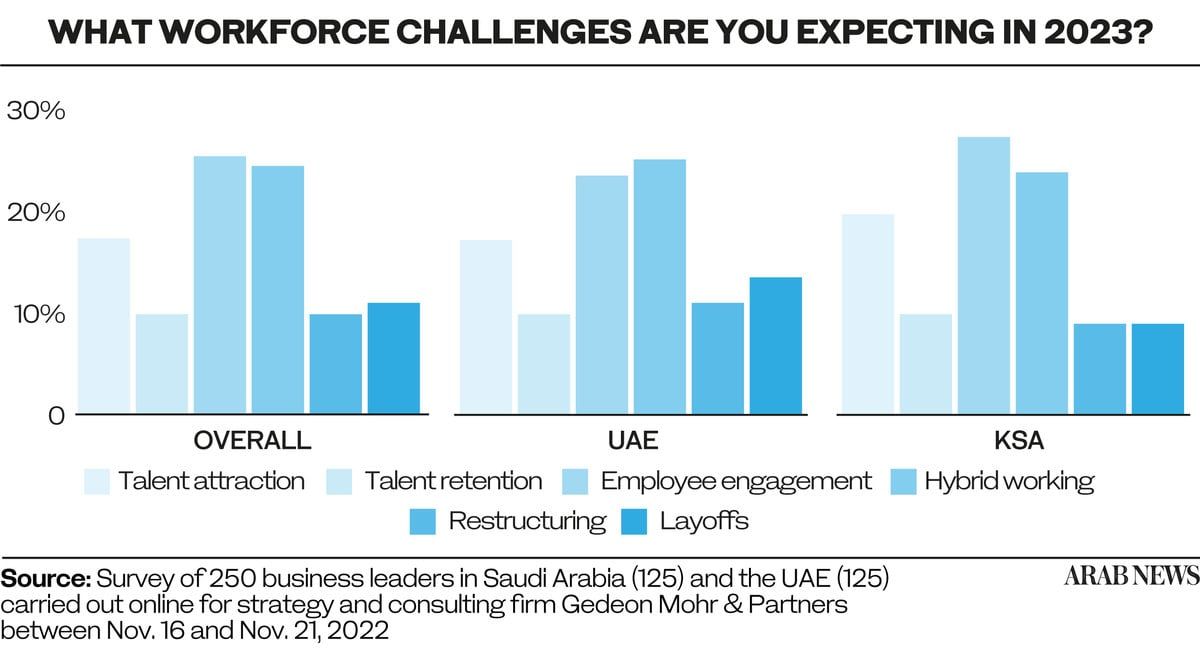
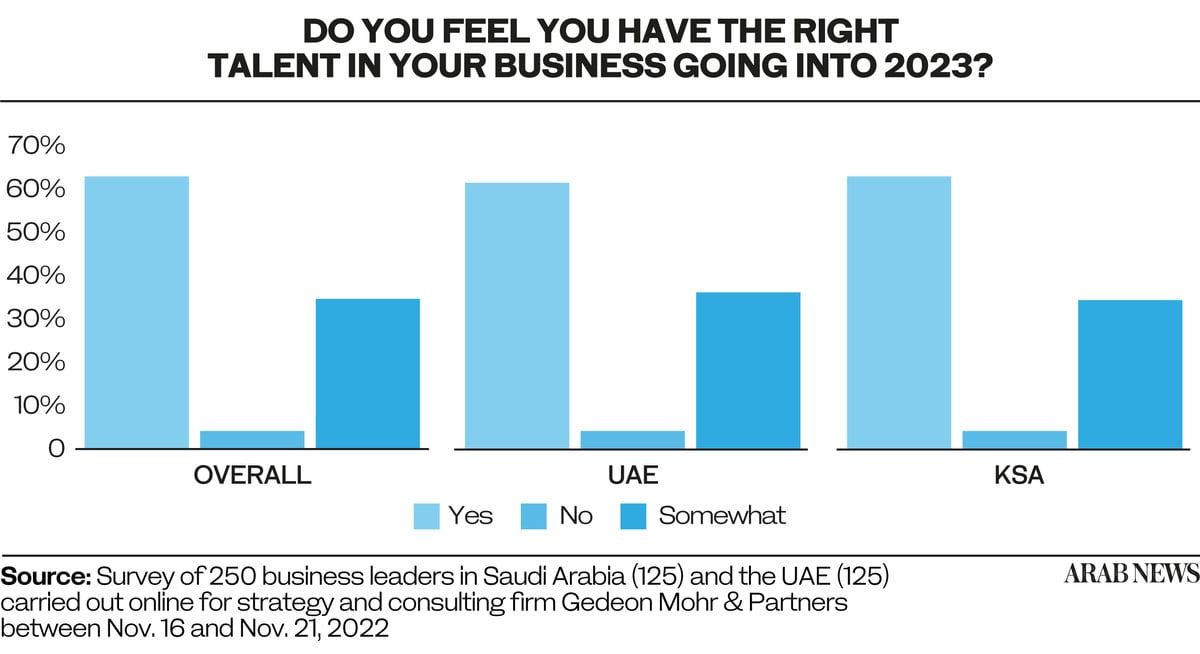

While overall 62 percent of business leaders felt they had the right talent in their business going into 2023, there were significant concerns about workforce challenges in the year ahead. Overall, 18 percent were worried about being able to attract talent, and 10 percent about retaining the talent they already had.
Despite the generally positive experience of remote working during COVID-19 lockdowns, a quarter of all respondents also saw hybrid working as a challenge in 2023. One reason, said Gedeon, was because of the unique nature of many of the big projects underway, especially in Saudi Arabia.
“A lot of these projects are truly remote and you need to be there, watching the project grow,” she said.
“If you’re developing on the Red Sea, it’s going to be very difficult to manage the project operating from New York, London, or even Dubai.
“So, there’s an eagerness to have people on site at projects such as NEOM, and they are building staff accommodation and even schools, making it exciting for people to work so far away from the capital and other cities.”
